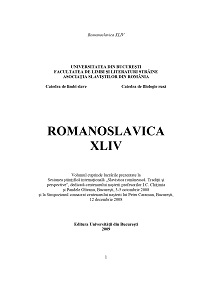Baia – oglindă a sufletului rus
Russian bania
Author(s): Alexandra DanilovSubject(s): Customs / Folklore, Visual Arts, Russian Literature, Sociology of Culture, Film / Cinema / Cinematography
Published by: Editura Universităţii din Bucureşti
Keywords: Russian bania; ritual; culture;
Summary/Abstract: One can say the easiest way to become acquainted with the Russian soul is through Russian literature and art, fields in which Russian soul expresses itself. This may be truth, however, there are aspects in which Russian soul does not express itself, but it manifests itself in the most natural way. Such aspects are faith, bathing in an ice-hole, singing, their drinking habit, bania (Russian steam bath), etc. Since medieval times, foreigners have been amazed by Russian's custom of beating themselves with venik in the hot bania and then run into the cold river or pour cold water upon them, or, in the Winter, wallow themselves in the snow. Even though communal baths were known in Russia (not only for poor people), a Russian will firstly think of home Russian bania, the well-known black-bania or white-bania, a wooden little house with two rooms, the first one, predbannik, where people let their clothes, and the steam room itself. Black-bania means that the stream gets out through the steam room itself, making its’ walls black, but heating and disinfecting it in the same time. Black-bania needs less fuel (wood, rush) then the white-bania, it keeps longer the heat, it is the most common and still used today. Bania was obligatory build farther from house, in order to avoid the extension of an eventual fire. Russians have always appreciated the healing powers of bania, sweating and health being, for them, almost synonymous. When they felt sick, bania was their first doctor. Associated with vodka, garlic, onion, massage and tea, bania had, mostly, great results in many diseases. The heat produces an artificial "fever" and urges every organ of the body into action. At the same time, sweat draws out lactic acid, which contributes to general fatigue and toxic metals, which the body absorbs in polluted environments. That is way skin has often been called the "third kidney." Bania is so important for Russians because, in their climate, skin cannot use its function of cleaning organism by sweating. At the same time, bania is a great warming and relaxing method, giving new forces for a new cold week. Russians pay special attention to the quality of steam. By throwing cold water on heated stones of the bania-stove (kamenka – made of stones), they create an easy breathing steam. Bania has benefic well-known effects in affections like rheumatism, low blood pressure, polyarthritis, obesity, neuralgia, etc., but it also has some contraindications: diabetes, high blood pressure, ulcer, varix. People with heart problems should also avoid sweat bathing. For Russians, bania also had a magic connotation. Various rituals associated to the critical moments of a Russian's life, birth, marriage and death, were conducted in bania. Russians used to be strong believers in the bania spirit, bannik. This spirit could look like an old man, a white cow, a snake, a black dog or cat, etc., and he lived in bania, under a stone or under the bench from the bania, polok. He could cause much harm if he was angry, therefore it was not permitted to sing loudly, to talk or to swear in the bania. Soap, water and the birch or oak bundle were left in bania for him. It is remarkable that, among all slavs, bania is only specific to Russians. They praised it in paintings, movies and literature. We cannot forget movies like The Irony of Fate, or Enjoy Your Bath, paintings like Kustodiev’s Russian Venus or Arkadi Plastov’s – Spring. Bania is present in the work of Vladimir Mayakovsky, Mikhail Zoshchenko, Vasily Belov, Victor Astafiev, Vasily Shukshin, Alexandr Melikhov or Samuil Marshak, but also in the work of Pushkin, Chekhov, Dostoyevsky, Feodor Abramov or Vladimir Vysotsky. Many Russian sayings are related to bania: “The bania is like the Russian's second mother”, “There can be no bania without a venik”, “Bania heals everything”, etc.
Journal: Romanoslavica
- Issue Year: XLIV/2009
- Issue No: 1
- Page Range: 211-220
- Page Count: 10
- Language: Romanian

